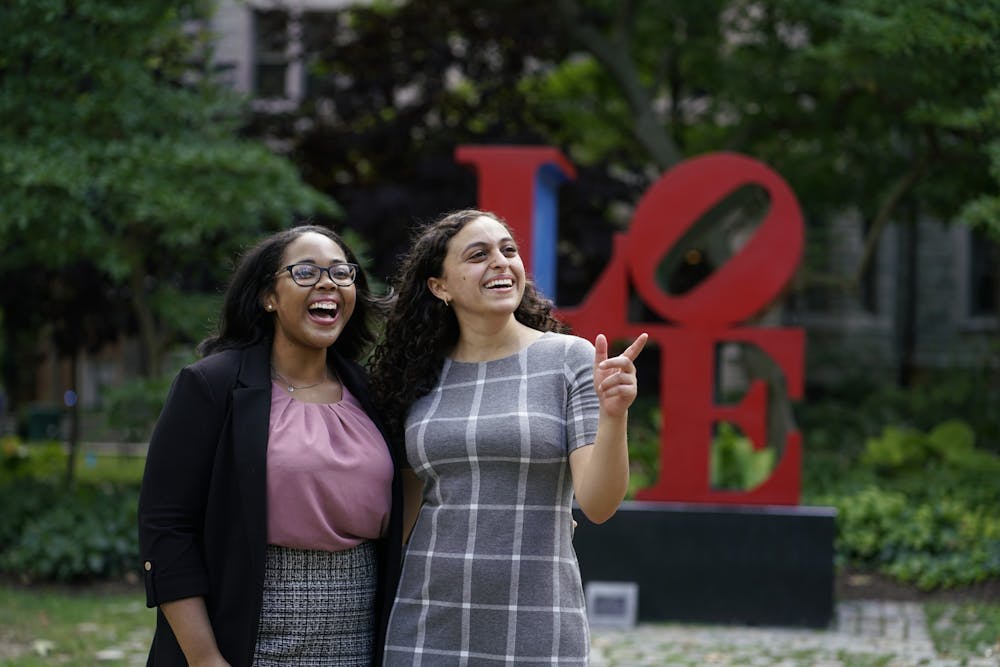
Earlier this week, College senior Mercedes Owens and College junior Mary Sadallah were elected to serve as Undergraduate Assembly President and Vice President, respectively, for the 2020-2021 academic year — becoming the first pair identifying as women of color and first-generation, low-income students to lead the student body.
The Daily Pennsylvanian sat down with the two new leaders over Zoom to discuss their goals for the year, which include increasing accountability for administration and the UA, providing more funding for Black student programming at Penn, and establishing spaces on Locust Walk for cultural resource centers.
With the shift to online learning earlier this spring and reversal of plans for a hybrid fall semester, Sadallah said she and Owens noticed many students were frustrated that communication from the administration has been unclear and infrequent, with a disregard for student input.
Owens said that she plans to follow up on the COVID-19 Status Report from the spring, which featured recommendations to the University from the UA on how to address students' concerns related to the COVID-19 pandemic. Some of those concerns included creating an emergency fund for vulnerable populations including FGLI, international, and LGBTQ+ students and providing funding for students who must return to campus and collect their belongings.
Owens said the new report, which will likely be released later this semester, will feature information collected from a student feedback form on whether students felt like their needs documented in the first report have been met by Penn.
“Admin loves data, and so this survey directly gives them that data, and we can hold them accountable that way,” Owens said.
Owens said key issues that she and Sadallah plan to press administration to act on will also include increased funding for UMOJA, the umbrella organization for Black student groups at Penn, and Makuu: The Black Cultural Center. When PSG announced its $250,000 donation earlier this semester to Black student programming at Penn, it also called on Penn to provide more funding for UMOJA and Makuu.
“It's not just about this year, because [the lack of funding for UMOJA and Makuu] is a problem that this school has had for a really long time,” Owens said.
Sadallah and Owens added that they will also push administration to finally secure spaces for cultural resource centers, three of which are currently housed in the basement of ARCH, on Locust Walk — a demand that Penn's main minority coalition groups, the 6B, has been making for years.
In the past, 6B student leaders have contrasted the cramped space designated to the cultural centers with the visible spots fraternities occupy on Locust Walk. They said they want minority students to have a more prominent location on campus.
Sadallah added that she and Owens will also collaborate with student groups to advocate for Penn's divestment from fossil fuels in meetings with administration, which she said was not a major priority for the UA in the past.
For years, student group Fossil Free Penn has advocated for the University to divest Penn's endowment from fossil fuels, and has previously shut down and blockaded Board of Trustees meetings.
Owens said she plans to start a monthly newsletter to report progress on UA projects to allow the student body to hold the student government accountable for their promises.
“In the past, the UA has tried to present itself as a very palatable organization, and we always want to be on good terms with administration. We still do, but this year we want to keep our demands intact,” Sadallah said.
Owens said she will also push the University to increase resources for students facing food insecurity, especially considering the negative financial impacts that the COVID-19 pandemic has had on students and their families.
“[Leading the student body as FGLI students] means a lot, because I don't think you realize what being a FGLI student really means until you get here,” Sadallah said. “At Penn, there's a level of disadvantage that you really don't even comprehend until you realize what so many other people have been given already.”
Owens said she hopes that she and Sadallah will be able to build a community and increase student engagement within the UA despite the online format.
“I am really honored to be in the position and I hope to just be able to address all the needs of all the concerns of the student body,” she said.
The Daily Pennsylvanian is an independent, student-run newspaper. Please consider making a donation to support the coverage that shapes the University. Your generosity ensures a future of strong journalism at Penn.
Donate



